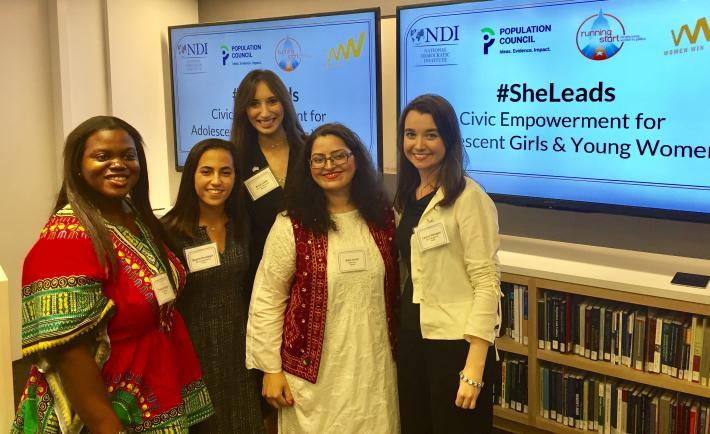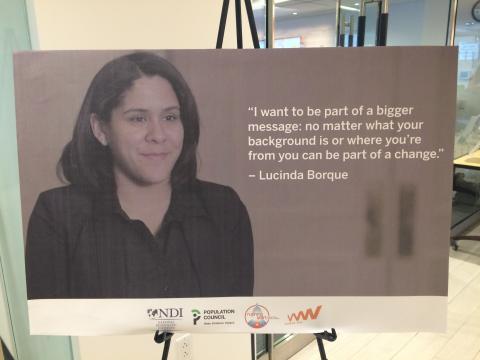
Today, in celebrating the International Day of the Girl Child, I wanted to reflect on the recent event focused on the political leadership of adolescent and young girls that took place on September 18 in New York City. Among the persistent honking, blaring sirens and crowds of people common with each convening of the United Nations General Assembly, seven young women -- all under the age of 30 -- took to a microphone to share their stories of political engagement. These women were from Kenya, Honduras, Nigeria, Pakistan, Ireland and the United States, but their stories declared a common theme: in order to ensure that we have an equal, representative pool of young women who are politically engaged, we must reach and encourage them before they reach the age to vote.
Partners in a new consortium, The National Democratic Institute, The Population Council, Running Start and Women Win, convened a meeting in the margins of this year’s General Assembly to present their idea for an innovative program to increase the political confidence of adolescent girls and young women around the world. Through multi-year, multi-country piloting programs it will empower adolescent girls and young women to lead positive, sustainable change in their lives and in their communities.
In New York, the young women shared their different experiences of building political confidence at an early age. Some had benefitted from, or had themselves established, peer networks that provided the solidarity needed to inspire political confidence. Networks included Moving the Goalposts (Kenya), Aware Girls (Pakistan), Girl Pride Circle (Nigeria) and Running Start & Elect Her (United States). Others described how early exposure to civic engagement programs – like NDI’s Candidate Schools and the United Nations Youth Delegate Program – had significantly impacted their political trajectory.
Their confidence lit up the room, and they told stories which all converged to the same point: girls’ confidence peaks in early adolescence, and, once they hit puberty, their horizons shrink while their male counterparts’ horizons expand. We know that the global community has capitalized on young women’s confidence by investing heavily in traditional personal development areas -- education, financial management, skills training, sexual and reproductive health -- during these formative years. However, little is being done to develop their political literacy and civic engagement skills. We can teach adolescent girls and young women that they have the right to guard their health, make decisions about their own schooling and earn the same wages as a man, but if they don’t have the capacity to advocate and legislate around those rights, any progress made is unsustainable, and, indeed, any gains can easily be lost.
The young women also gave examples of what this programming looks like in practice, and how it impacts the participant and the community as a whole. It was emphasized that when girls gather, whether it’s for a game of volleyball or collective participation in a harvest festival, they are reclaiming public space that society has historically excluded them from. When girls see their likeness reflected in this public space, whether it’s through a local council leader or a female head of state, it’s one step of many to the development of their own self-confidence, one step closer having male power holders and community leaders accept them.
Andrea from Honduras said, “It is important to get into politics as a woman, but it’s more important to get into politics as a kid, because it empowers our little girls and teaches them how to defend themselves and how to fight for their rights.”
From Doreen in Kenya, a trenchant critique of politics there: “Kenyan politics is all about how old you are and how much you can give to your electorates. However, from the just concluded election, people have started to believe more in the vision of the leader - not their age or financial capabilities. Because of this, I am even more motivated to pursue my political aspirations.”
Of her experience in challenging gender norms, Saba’s testimony of her experience in Pakistan was: “Since I was 15, I have been working in an environment where young women are deliberately excluded from political participation. I want to challenge this situation and to make a difference.”
Deliver for Good Young Leader from Nigeria, Ola, said: “Spending my formative years as a teenager debating policy, holding mock parliamentary sessions, and going to the grassroots to engage in advocacy defined me. My conversations shifted from cute boys and lipgloss to girls' education and removing violence from girls.”
One of Ireland’s UN Youth Delegate, Lauren, revealed: “I went from bystander to political activist overnight ... I realize how fundamentally wrong it is that so many young women only enter into politics as a result of hardship, or just as a coincidence.”
Finally, one of the speakers from the USA, Sophia, closed out the event by explaining: “Straddling two cultures, religions and families is difficult. Yet so much of who I am today and who I want to become is a product of my heritage. When I run for public office, it will be in a platform steeped in a patchwork of my family’s philosophy -- understanding our commonalities and celebrating the power that comes from our differences.”
Over the coming months, the Consortium will put the finishing touches on developing its various pilot interventions, for implementation in several countries, in order to learn the best ways to increase the meaningful political engagement of adolescent girls and young women. The partners will draw on their collective decades of experience working with young women and civic empowerment to develop, implement and learn from these pilots. We aim to deepen the pool of adolescent girls and young women ready to lead by reaching them before the confidence gap between them and their male counterparts widens. This confidence will not only enable them to become civic leaders, but it will also have secondary and tertiary positive benefits in other areas of their lives.
We know that adolescent girls and young women have a voice. So today, in observance of the International Day of the Girl Child, and always, let’s turn on the mics, turn up the volume and help them amplify their leadership.

